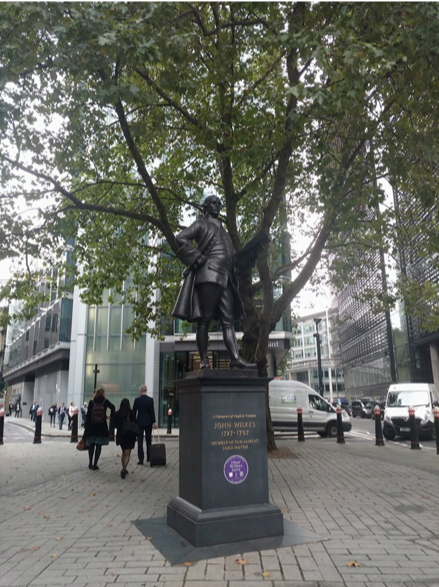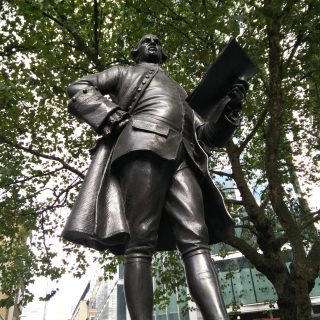Back at the end of September, almost 400 new LLB students joined us at City. As part of their induction week, they undertook the Exploring the Law exercise, which assigns students off on one of 8 routes around London, exploring buildings of legal significance. Their task? Initially to find the buildings, do some research and take some photographs, whilst getting to know others in their new tutorial groups. The second part was to write a short piece on something they’d been inspired by on their travels around legal London. 21 prizes were given for the best entries and this one by Zara Bedassie was given first prize. Well done Zara! You can read other Exploring the Law entries from previous years by following the #exploringthelaw tag.
My parents always told me that I should be careful of talking to strangers. I wonder what they thought about me wandering into London with a group of strangers, of whom I knew nothing about beyond their numbers on a Whatsapp group. Oops? Its fine since it’s for school, right? Despite the bleak weather, we embarked upon this journey together.
Regardless of the grandeur and history of the other locations, it was John Wilkes that left the biggest impact on me. John Wilkes, rightly dubbed a “Champion of English Freedom”, according to his statue anyway, lived a life that was both controversial and remarkable.
 Despite being born in 1725, he was an individual that arguably possessed political insight beyond his time period. The people’s rights at this point were limited since the criteria to vote was based largely on wealth. This meant that representation in the government was centered around the wealthy few rather than the majority. Wilkes’ brutal criticism and open rebellion against Parliament made him a popular symbol of freedom in the country. He was therefore able to gain the support of persons from all social statuses. After being elected into Parliament, he fought for an extension of franchise since he believed that even the poorest labourer should be represented in Parliament.
Despite being born in 1725, he was an individual that arguably possessed political insight beyond his time period. The people’s rights at this point were limited since the criteria to vote was based largely on wealth. This meant that representation in the government was centered around the wealthy few rather than the majority. Wilkes’ brutal criticism and open rebellion against Parliament made him a popular symbol of freedom in the country. He was therefore able to gain the support of persons from all social statuses. After being elected into Parliament, he fought for an extension of franchise since he believed that even the poorest labourer should be represented in Parliament.
Although he is often associated with the freedom of press, Wilkes political views interested me the most. His resolute attitude and willingness to speak up are qualities I hope I can develop within myself one day. As a student in the year 2017, it is startlingly easy to apply Wilkes’ political campaign to our political climate. Almost three hundred years later it is shocking to realize that many are still fighting for adequate representation in government. Despite years of protesting, it can be argued that the government is still being controlled by the elite in society and their best interests. Although he wasn’t an advocate for universal suffrage, Wilkes’ policies still bring to light the under-representation in our government today. This includes the lack of diversity in race, age, sex and even economic backgrounds. Was three hundred years not enough time to achieve equality? It begs the question, as a society why are we so afraid of progression.
While writing this, my mind (and my mouse) has wandered to the internet where I was flooded with articles about the Catalan referendum and the strong-armed approach the Spanish government has taken to prevent the vote. Thanks to social media, events such as this are broadcasted for the world to see. Burly police men attacking old men and women, fighting for their right to representation. The crowds of protestors as the Spanish Prime Minister claims that no referendum has taken place once again brings Wilkes to mind. Ever the fan favourite, he was elected as the candidate for Middlesex twice during his imprisonment which was declared null by the government. A candidate was instead appointed by parliament. This incensed the electorate as they understood that democracy was just an act, their elected candidate was selected for them anyway. This sparked outrage and disruptions where many were killed in the response. Sounds familiar, doesn’t it? It’s a sobering thought that even with three hundred years between us, history might always be doomed to repeat itself.

